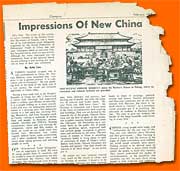
Champion, newspaper of Canada’s Communist Youth, ran this article reporting my impressions of China.
|
I began 1957 in the warm embrace of my family of choice, Howland House community. I soon found work as a guillotine operator at Ratcliffe paper plant, a few blocks from the house. Experience helped: I’d operated a guillotine during one of my high-school summers. A "guillotine" trims the edges of stacks of paper sheets and cuts them to size. By expanding summer and part-time jobs, I faked a work history that excluded my university years and trip to China. There were many relaxed moments in the warehouse when I could share life with my journal.
January 18: Today some salesmen from Head Office stopped by. One of them used the washroom, then complained: “At Head Office all we get is Eaton's catalogue to wipe our asses, but in the warehouse they’ve opened a box of the top line!”
Champion, the Communist Youth newspaper in Canada, has asked to interview me on my China trip, but I’ve insisted on writing an article to be published as is. I’m familiar with Communist editing!
February 1. I’m sure the editors choked. I wrote: “China is a nation both liberated and suppressed under a ruthless and efficient government called a ‘people’s democratic dictatorship.’ The official Chinese line is that the ‘Hungarian fascist counter-revolution’ has no mass support whereas we all know Hungarian refugees are pouring into Canada, fleeing the Soviet tanks that crushed their revolt.” But the focus of my article is the stunning progress in China since Liberation. The editors printed it with a disclaimer but without alteration.
February 5. A radical young Catholic, Yvan Corbeil, arrived today to live in the House for a year. We’ve become instant friends; my French helps me correct his English, and his field is also sociology. He’s involved with the Jeunesse Ouvriere Catholique, and loves discussing politics, philosophy and science. [Yvan would eventually found a successful Quebec polling organization, CROP. He remained a good friend until his dying days, which were not pleasant, due to muscular disease].
|
|
|
February 12. I’m back in stride intellectually, organizing a University Peace Conference by getting Howland on side, then the U of T SCM, then the campus CCF. Peace is a perilous topic and many students are afraid to be tarred com-symps if not subversives by the McCarthyites. The fact that I’m the first Canadian student to visit Red China makes campus people even more nervous. Professor Jim Giffen says the Mounties are on campus, asking questions about me.
With SCM support, I’ve persuaded the Catholic Newman Club to join in, the International Relations Club, Hillel (Jewish) Foundation, the UN Club, and finally the campus Conservative and Liberal Clubs. Even the Chemistry and Biology clubs have signed up. I did not approach the campus Communist Club, fearing their participation would cause other groups to drop out. With such broad support I met no difficulty in securing Student Administrative Council funding for the Conference. Now I’m recruiting major speakers, and preparing all the publicity, using paper “borrowed” from my employer. Old habits die hard.
|
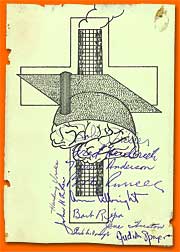
The Canadian SCM work camp booklet for 1957 bore a cover of my design. National committee members autographed the original. (Note: I was still calling myself H.R! )
|
February 21: The Peace Conference was a great success. On Tuesday we had a panel of five scientists working with atomic energy. Wednesday offered four renowned speakers on international relations, and a panel on religion and peace: three Christian leaders and a rabbi. On Thursday, a workshop with “experts” from civil defence and one of their “instructional films” about hiding in cellars. Dr. Murray Ross, the university vice-president, chaired a panel on the politics of disarmament featuring Wilson Woodside and the leader of the Ontario CCF. All sessions were in university buildings, at negligible cost. I organized a series of lunch-hour films too. Student turnout was excellent and all events went off without a single technical hitch or disruption by opponents.
March 1. My many photos and slides of China are developed and the U of T SCM invited me to present a show-and-tell today. At a social afterward I met a pretty SCMer, Jean McIntosh, and asked her for a date.
March 24. Jean’s birthday. She is an lively, slim, dark-haired woman who enjoys both the outdoors and the cultural life of theatre and music. As oldest daughter of a professional family, Jean’s upbringing emphasized education, good citizenship, and strong family bonds. Everyone at Howland (my family) agrees that we “would make a good match.”
July 3. Numerous church groups have asked me to present my China slide show. Sometimes Jean comes along. Yvan Corbeil used his Quebec connections to arrange for me to meet with Pierre Trudeau and two friends (Pelletier and Marchand). Trudeau is editor of Cité Libre. They were gracious hosts, keen to hear my impressions of China, and asked many probing questions.
August 24. Jean joined with the Howland group to celebrate my 24th birthday. Absolutely super. Life here is wonderfully therapeutic. I am finally unloading my childhood anger, though I fear my housemates sometimes get splashed on.
October 14. Rev. Dan Heap, an Anglican worker-priest employed as a printer at Gair Paper Box on Commissioner Street, informs me that the company is hiring. It seems a great idea to have two SCMers there. I’ve applied, again faking my job record to hide my degree, but I have a real job at Ratcliffe they can check out.
October 18. I’m hired! I will feed huge corrugated sheets into a press which prints and cuts them into cardboard boxes. It’s shift work – one week of days, then 4 PM to midnight, then midnight to 8 AM.
October 20. Home from my first midnight shift. We worked for three hours, slept two hours, then worked. When the bosses arrived at 8 AM they found us busy. Workers have their ways of surviving! Dan Heap is more adroit than me at mixing with the workers. I have to censor myself against expressing any intellectual idea or using any polysyllable word.
November 1. Ernie Lockwood is the most interesting guy in the plant. He is already good friends with Dan and is taking a liking to me. He’s street smart – a school dropout with great talents in mechanics and manipulating people. His wife Barbara is a quiet, hardworking housewife.
I’ve been using my motorcycle to get from Howland to the factory. Last night I nearly killed myself. Head down in the rain, I ran into the back of a parked truck. Now Ernie is urging me to buy a 1946 Ford for $100. He claims it still runs well.
November 15. I painted the Ford red, by hand, and installed a signal blinker kit on the steering wheel. Mrs. Miller, still a licensed driver, goes with me while I practice driving. I gave her a few white hairs today when I nearly hit another car.
December 27. Christmas was again full of love and affection. Other House members show a magnanimous acceptance of my weird ways. On Boxing Day four of us took a holiday trip to Montreal in my car. We drove too fast for an old engine, and threw a piston in the middle of the night. Dear Margaret has loaned me $500 to rescue the car and install a new motor.
|
| |
1958
February 20. The first major faultlines are developing in Howland House. Margaret has left her job in the chocolate factory, to the great distress of her fellow workers. She was relied on as a militant in the union. John Anderson was laid off from his typewriter factory job, and has left industry to work in Bob Miller’s burgeoning bookstore.
March 4. Allan Millard writes from Ottawa: “Marriage and homemaking is a wonderful adventure and great happiness. I heartily recommend it.” Jean and I are going steady now.
April 17. Some of my dates with Jean are political events. I’ve been nominated as CCF candidate for Broadview riding, running against MP George Hees. The Gair plant is located in the riding, so I already know working-class voters. Woodgreen Community Centre (where I do boys’ work) is in the riding too. I don’t think I’ve mentioned that I volunteer as a detached street worker with a teenage gang. Wilky (February 20, 1956) is the gang leader. Funny how paths cross.
April 20. Jean has become an active worker in my campaign. Ernie and Dan also help. Naturally I’m a sacrifice candidate – my job is to build a riding organization, not to win the election. I’m apparently the youngest federal candidate this year. [We did build a strong organization, and with a more mature candidate the CCF took the riding in the next election].
April 25. Getting married is not an easy decision. Am I truly in love with Jean? I’m not sure. That’s a bad thing, romantically speaking, but a good thing, sociologically speaking. She’s a sensible choice: SCMer, CCF supporter, social worker, and she has grown up in an admirable family.
Jean says she realizes from my speeches and enthusiasms that we will never be an ordinary couple. We don't kiss much on dates, and I feel awkward about petting. Jean is not as erotic as Nancy was, and she insists on petting only in her home. Last night we “necked” in her living room while her parents slept upstairs. I hope they were asleep!
April 30. We have announced our engagement. Jean has OK’d my proposal to buy a house in the Broadview area. We will form a co-operative with two other families. Ernie and Barbara Lockwood have already promised to join us. Jean’s father is giving the down payment as a wedding present in advance.
May 15. Ernie and I have been looking at houses. Tonight we checked one for a second time, with John McIntosh along. It’s a corner house at Howland Road (a good omen?) and Langley Avenue. There are three stories, with two kitchens now, and enough space for another on the third floor. The owner is asking $15,000 and is willing to take back a mortgage at a good rate. Now the problem is: where do we find a third family?
June 5. I have persuaded my old Camp Three Arrows friends, Rolly Parker and his wife, to take the second floor. Ernie and his family will take the first floor, and I’ll renovate the third floor into an apartment.
June 22. The time for my final driving test is drawing closer and I still need practice in heavy traffic. Today I asked Vince Goring to accompany me as the licensed driver. I came so near to hitting a streetcar that I doubt he’ll go with me again.
July 7. Now that Ernie and Rolly are ensconced, we’ve all noticed that buying a house at night is not a good idea. If you drop a plumb line from the eaves to the ground, it hangs six inches out from the wall.
Jean has a good job at a Children’s Aid summer camp. I spend my spare time tearing out old plaster and lath, to construct a new kitchen. My materials are better than orange crates, but not much.
August 24. For my 25th birthday party, Bob Miller organized a “marriage rehearsal.” He thinks I need preparation for the idea of being married: “John, you’re not behaving as if you’re madly in love.” I told him it was not easy to leave Howland; “It has become my Nirvana.”
When have I had time to fall in love? Eight hours a day I work at the factory. My spare time goes to the CCND, the CCF, Camp Three Arrows, volunteer boys’ work, Howland House, and most recently, six hours a day of renovation work. But at last the apartment is livable and I’ve moved in, after a tearful goodbye to Howland.
|
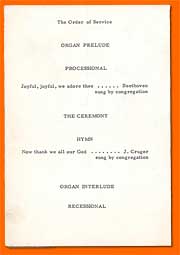
Jean and I designed our own Order of Service, encouraging more congregation participation.
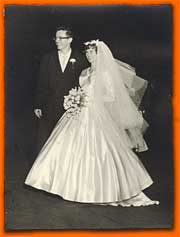
Our formal wedding portrait.
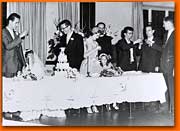
The toast to the bride. From the left: David, my brother, Jean, myself, Jean’s sister Margaret, Betsy ( seated; child of the Andersons at Howland House), the officiating minister in the background, Wilky, Yvan Corbeil, and Robert Miller.
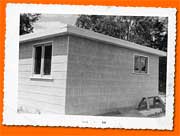
The main building of Camp Three Arrows was hardly imposing, but it was a major achievement for a tiny group of young socialists.
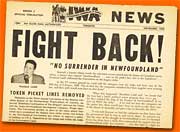
A copy of the IWA newspaper I was writing and editing, but nowhere mentioned; Harvey always took pride of place.
|
September 6, 1958. Jean and I are to be married today at the "cathedral of the United Church" – Metropolitan, on Queen Street in Toronto. John McIntosh wants his daughter married in style; there will be more than two hundred guests.
Since it isn’t a Quaker marriage, Jean and I made some changes in the United Church ceremony. Instead of a processional march, everyone will sing a hymn set to Beethoven's Ode to Joy. The recessional is also a hymn: Now thank we all our God.
The maid of honour is Jean's sister Margaret, and little Betsy Anderson is the junior bridesmaid. My brother David is best man; the ushers are Yvan Corbeil, Jean's brother David, our SCM friend, Dan Norman, and James Wilkinson, better known as Wilky, leader of the Queen Street boys' gang. The guests include Joe and Orca Shinaman (Beverly died recently) and all the residents of Howland House.
September 8, at Camp Three Arrows. At the reception I extended the customary brief speech by the Groom (thanking parents and friends) to a ten-minute lecture on the history and significance of Christian marriage! Sitting beside me was the master of ceremonies, and now my father of choice, Bob Miller. He whispered as I sat down: “The irrepressible John Lee can’t resist another opportunity to preach!”
We both began marriage as virgins, spending our wedding night at a motel on Kingston Road in Scarborough. Next day we broke with convention by slipping into the balcony of the local church where most Howlanders worship. [Later, Bob Miller chastised me for this symbolic reluctance to leave Howland House: "A honeymoon is just the two of you, breaking your links with the past."]
September 13. We honeymooned a few days at Camp Three Arrows – cheap and all to ourselves – and sailed on the Manitoulin Island ferry, Jean’s first voyage. It was a rough day and Jean got seasick. We drove home via the SCM National Conference at Bala, visiting Vince and Kathleen Goring, who were unable to attend the wedding.
September 14. Jean has moved into the newly renovated third floor of Langley, bringing the many goodies we received as presents. Few working-class boys receive such a comfortable launch into matrimony!
October 1. Boris Mather, a loyal Three Arrows camper and active trade unionist, says the International Woodworkers of America is looking for a Research Director. “Why don’t you try for it?” he encouraged.
October 5. I rushed to see H. Landon Ladd, president of the Eastern Canadian District of the IWA. My unusual combination of education (now admitting my B.A.) and political experience prompted him to hire me on the spot!
H. Landon Ladd –known to his friends as Harvey – is a big, beefy man with a powerful voice that requires no amplification to reach the back rows of union meetings. He’s a classic union leader – a factory worker with street smarts who caught the eye of a friendly union steward, and moved up the ranks to a full-time union job. "It’s better to work for the workers than to be one," Harvey grins.
November 3. Harvey has assigned me to prepare the next issue of the union's monthly house organ, IWA News. My name will not appear; Harvey’s ego demands that he be listed as editor, and represented by several photos throughout the paper. Harvey has powerful rivals who want his job.
November 3. Harvey has learned from Orwell. Photos are cropped to emphasize him, or totally eliminate rivals. News about the union is always good news. When I proposed a new "Family Page" because many copies go home to wives, and some of our members are women, Harvey approved, and promptly submitted a Recipe from Mrs. H. Landon Ladd .
December 5. I’m travelling to local meetings armed with my notebook and Jean’s camera, seeking local colour for the News. My financial fortunes are enormously improved compared to work at Gair Paper Box. I now have a good salary, a car allowance and an expense account. It is indeed better to work for the workers.
December 15. Harvey is in Newfoundland, where two pulp and paper companies employ 30,000 people, one third of the working force of the province. 10,000 of those are loggers organized into the IWA.
December 20. Harvey says organizing is a unique problem in Newfoundland: many men on the island have no year-round work. They are employed for a few weeks or months in the fishery, either on the boats or in the fish plants. Off season, they look for work in the woods. Thus a whole social class, not just employees of a company, must go on strike and remain united.
Life for the fishermen/loggers is miserable. They live mainly in small and declining towns and settlements, or in "outports" around the coast. Most are in hock to the local merchant, since they buy groceries and fuel when unemployed by "putting it on the chit" to be paid for when work comes. To convince such men to refuse that scarce work in the name of a strike for better wages is difficult in the extreme.
The IWA slowly persuaded loggers to sign union cards. In two years there were enough signed loggers to win "certification" as a bargaining unit. The employers are compelled by law to bargain with the logger's official representatives, but they are certainly not forced to agree to the IWA's demands. In fact, management is confident that they can easily break a strike by hiring unemployed fishermen to replace loggers on strike.
Today Harvey ordered me to go to Newfoundland right after Christmas.
|

![]()

![]()